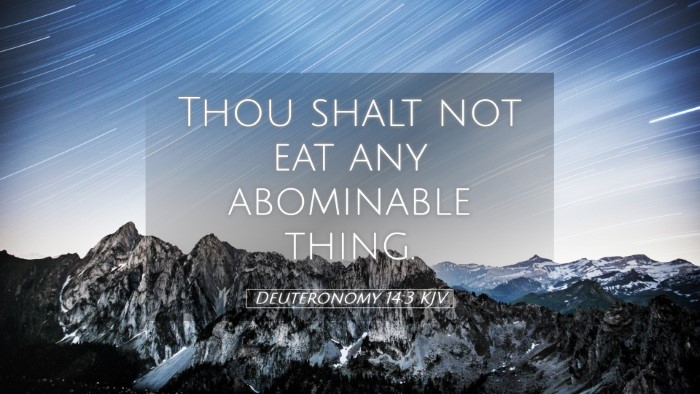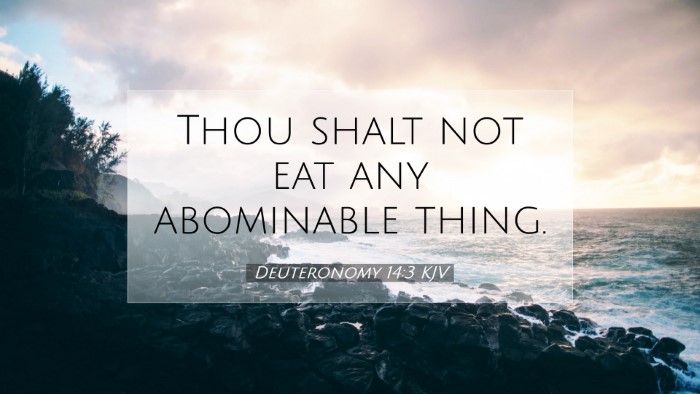Deuteronomy 14:3 Commentary
Bible Verse: "Thou shalt not eat any abominable thing."
Introduction
The verse in question, Deuteronomy 14:3, serves as a pivotal reminder of the holiness and distinctiveness required of God's people. This command not only emphasizes dietary restrictions but also reflects deeper spiritual truths cherished by theologians and pastors alike. A careful examination through various commentaries reveals layers of meaning appealing to those engaged in biblical scholarship.
Contextual Background
Deuteronomy, as the name suggests, means "second law," and it presents Moses' instructions to the Israelites before they enter the Promised Land. This section, specifically chapter 14, deals with clean and unclean animals, illustrating broader themes of purity, obedience, and the covenantal relationship between Israel and God.
Matthew Henry's Insights
Spiritual Symbolism: Matthew Henry highlights that the dietary laws are not arbitrary but are laden with divinely inspired symbolism. The clean animals, which include those that both chew the cud and have cloven hooves, represent holiness and separation from the world. In contrast, the unclean animals symbolize sin and impurity. Followers are called to reflect God's purity in both spiritual and physical aspects.
Obedience to God: Henry further notes that God's commands are to be obeyed wholly, without selective adherence. The prohibition against consuming "abominable things" is indicative of a larger principle: believers are to seek purity in all aspects of life, illustrating the necessity of obedience as an expression of faith.
Albert Barnes' Examination
Cultural Significance: Albert Barnes provides a historical perspective, explaining that many animals deemed unclean were often linked to pagan practices and idol worship. By avoiding these animals, Israel was to separate themselves from the customs of the surrounding nations. This separation is crucial in understanding the covenant identity the Israelites must maintain, which resonates with modern spiritual implications of being distinct from worldly influences.
Moral Obedience: Barnes draws parallels between the physical and spiritual aspects of God's commandments; the avoidance of unclean food is akin to avoiding moral and ethical corruption. Here, obedience to God's law serves as a safeguard against spiritual decay. This principle extends into the New Testament as believers are advised in 2 Corinthians 6:17 to "come out from among them, and be ye separate."
Adam Clarke's Elucidation
Delineation of Clean vs. Unclean: Adam Clarke elaborates on the classifications of animals allowed and prohibited for consumption. He carefully dissects Levitical prerequisites that determine clean and unclean statuses. Clarke emphasizes that these laws were not merely meant for dietary guidelines but were intended as pedagogical tools to instruct the people about spiritual cleanness.
Typology of Christ: Moreover, Clarke interprets this verse as a foreshadowing of Christ. Jesus, referred to as the Lamb of God, epitomizes the ultimate fulfillment of the sacrificial system as He embodies the nature of purity. Clarke challenges readers to see the relevance of the Old Testament laws in light of the New Covenant, thereby necessitating holiness in spiritual practice.
The Theological Implications
The implications of Deuteronomy 14:3 stretch beyond its immediate historical and cultural context, inviting deeper theological reflection. The directive against consuming abominable things calls for a holistic understanding of what is considered unclean in our spiritual lives.
- Holiness as a Calling: The call to purity serves as a reminder that believers are a royal priesthood, a holy nation (1 Peter 2:9). The emphasis on dietary laws underscores the broader Christian duty to embody holiness in thoughts, actions, and lifestyles.
- Guardians of Faith: Like the Israelites, modern believers must guard against 'abominable' practices that corrupt spiritual integrity. The verse challenges congregations to reflect on what influences may be present in their lives that could lead to spiritual compromise.
- Christ as the Fulfillment: In recognizing that Christ fulfilled the law's requirements, believers are reminded of their freedom in Christ (Galatians 5:1) but are also called to a higher standard of living that honors God through obedience to His Word.
Practical Applications for Today
The message in Deuteronomy 14:3 remains profoundly relevant for contemporary Christian living.
- Discernment in Choices: Pastors and leaders are encouraged to teach their congregations about discernment, helping them to identify what may be spiritually detrimental in their lives today, encouraging a lifestyle that mirrors Christ’s teachings.
- Community Standards: Church communities should foster an environment where holiness is celebrated and upheld, thus encouraging members to support each other in pursuing righteousness and integrity.
- Witness to the World: Emphasizing the call to be a holy people can impact evangelism, as a distinct lifestyle beckons others to inquire about the hope believers uphold.
Conclusion
In summary, Deuteronomy 14:3 encapsulates profound theological insights regarding God's call for His people to remain pure and distinct. As explored through the lens of public domain commentaries, the verse extends beyond dietary laws to touch upon themes of spiritual obedience, moral clarity, and the embodiment of holiness in daily living. It remains a guiding principle for pastors, theologians, and all who earnestly seek to live a life that reflects God's character and purposes.


